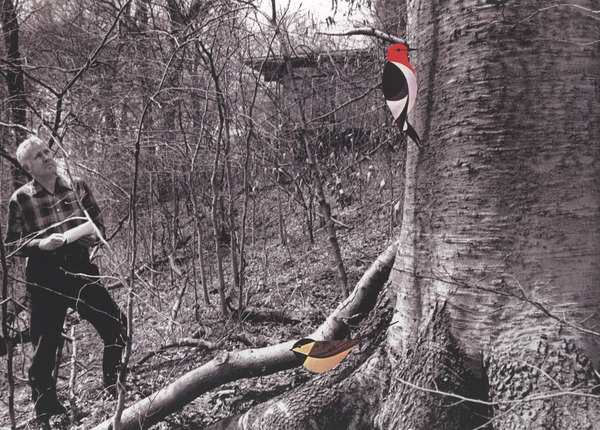Charley Harper - Henning Bohl
dal 23/6/2011 al 10/9/2011
Segnalato da
23/6/2011
Charley Harper - Henning Bohl
Kunstverein Hamburg, Hamburg
Birds, mammals, insects, reptiles, fish, the artwork of wildlife artist Harper is a visual ecosystem in which elements of colour, shapes, lines and subjects are interdependent and perfectly balanced. 'Cornet of Horse' features installation settings by Bohl that are linked both in terms of content and in terms of recurring motifs and materials and the way these are employed.

Charley Harper
Birds, mammals, insects, reptiles, fish, the artwork of wildlife artist Charley Harper (1922 –2007) is a visual ecosystem in which elements of colour, shapes, lines and subjects are interrelated, interdependent and perfectly balanced. Harper had an unique ability to capture the essence of any living organism. His works still challenges our previous perceptions of nature, and offers a new and unexpected way to enjoy it, both visually and verbally.
In a style he called "minimal realism", Charley Harper captured the essence of his subjects with the few-est possible visual elements. As an artist, he was less interested in creating the illusion of dimension than he was in capturing the infinite patterns and designs of nature. Unlike traditional super realistic wildlife art, his is flat, simple, playful and funny. When asked once to describe his unique visual style, he responded: "When I look at a wildlife or nature subject, I don’t see the feathers in the wings, I just count the wings. I see exciting shapes, colour combinations, patterns, textures, fascinating behaviour and endless possibilities for making interesting pictures."
His style distilled and simplified complex organisms and natural subjects without losing identity, yet they are often arranged in a complex fashion. Using his mechanical drawing tools: ruling, pen and compass, T—square, triangles and French curves, Harper drew orthographically, using direct front, rear, side, top and bottom views to reveal the uniqueness of the creature he depicted.
Showing his work for the first time in Germany the exhibition in the Kunstverein Hamburg assembles more than 60 silk screens of Charley Harper’s colourful wildlife.
---------------------
Henning Bohl
Cornet of Horse
The exhibition "Cornet of Horse" features several installation settings by Berlin-based artist Henning Bohl (born in 1975) that are linked both in terms of content and in terms of recurring motifs and materials and the way these are employed. Besides referring to each other, Bohl’s works also contain numerous, often subtle references to other art (movements). While his use of references follows a certain logic, it does not necessarily aim to produce meaning. Bohl is more interested in creating arrangements that tell stories and in how they are told.
The exhibition in Hamburg is centred around two objects that resemble tables insofar as they have four legs (made from Schultüten, paper cones that are filled with small gifts and given to German children on their first day of school), a horizontal frame (a stretcher frame of the type used for mounting canvasses) and an oversized "tabletop" (made of plywood and fibreboard). Only touching the ground on the tips of the four Schultüten, the objects appear to be in a precarious state of balance and almost seem to float. The stretcher frames – horizontally placed pictures, so to say – bulge upward towards the ceiling, as they are, in a sense, “hanging” from the floor on the paper cones. The Schultüten themselves display various images representing abundance and plenty – conveying the concept of a “cornucopia” on several different levels.
In the works in his "Frog Substitutes" series from 2011, which are also featured in the Hamburg show, Bohl uses elastic bands and rope to mount bicycle helmets into openings in the canvases – very literally applying his subject to the picture surface.
In addition to exploring various possibilities for generating picture motifs, Bohl also poses questions about the presentation and staging of art. Large-scale canvasses featuring collages of layered shapes cut from rolls of paper hang from plasterboard elements that are piled on sawhorses, creating their own architecture alongside the architecture of the exhibition space. This questioning on the part of the artist – which for him can never be finally resolved – causes the status of his work to be relativized in several different ways. Thus the pictures are relegated to the status of stage props, while the means of presentation take on an independent sculptural and conceptual significance of their own.
Further information and press material
Beate Anspach I Kunstverein
anspach@kunstverein.de
Image: Charley Harper, The Name is Puffin, 1971
© Charley Harper Art Studio
Opening Friday, June 24, 2011
Kunstverein Hamburg
Klosterwall 23 - Hamburg
Opening Hours: Tuesday – Sunday and Public Holidays 12 am – 6 pm
Admission: 3,- Euro / Reduced 1,50 Euro
Free entrance for members of the Kunstverein, kids and young adults under age 18



